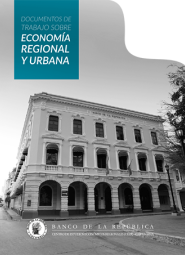Disinflation Costs Under Inflation Targeting in Small Open Economy
La serie Borradores de Economía es una publicación de la Subgerencia de Estudios Económicos del Banco de la República. Los trabajos son de carácter provisional, las opiniones y posibles errores son responsabilidad exclusiva del autor y sus contenidos no comprometen al Banco de la República ni a su Junta Directiva.
Since 1991, inflation in Colombia was reduced from 25% on average to about 6% more recently. Although this performance is in line with a long run inflation target of 3%, some analysts ask whether the Central Bank should continue disinflating. In this paper we present a dynamic stochastic general equilibrium model of inflation targeting for a small open economy to answer this question. We calibrate the model to the Colombian economy and compute the welfare cots and benefits of achieving the long run inflation target. We find that the long run welfare gains are about 4.54% in terms of capital. Furthermore, accounting for the transition the welfare gains are about 1.18% in terms of capital. Our results differ from previous findings because transition costs are introduced and our environment considers the presence of real rigidities (monopolistic competition) and nominal rigidities (sticky information) in a small open economy. We also analyze the sensitivity of the results to some key parameters and conclude that higher price flexibility leads to lower gains from reducing inflation and that a country with markups. The weight given to the inflation gap in the monetary policy rule is important, as a more aggressive Central Bank can improve welfare. Finally, we find that disinflation is more expensive in the case of a closed economy.
La serie Borradores de Economía es una publicación de la Subgerencia de Estudios Económicos del Banco de la República. Los trabajos son de carácter provisional, las opiniones y posibles errores son responsabilidad exclusiva del autor y sus contenidos no comprometen al Banco de la República ni a su Junta Directiva.





















































